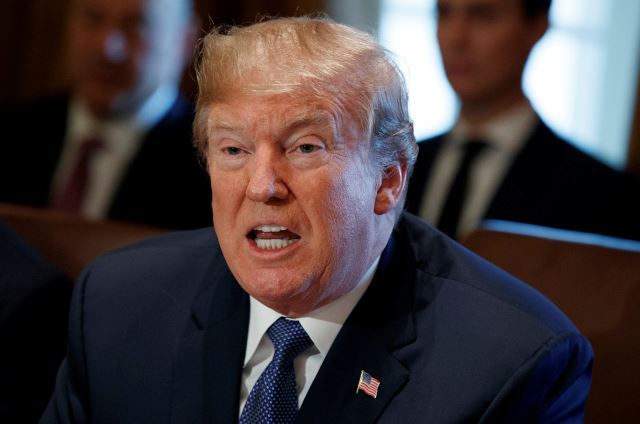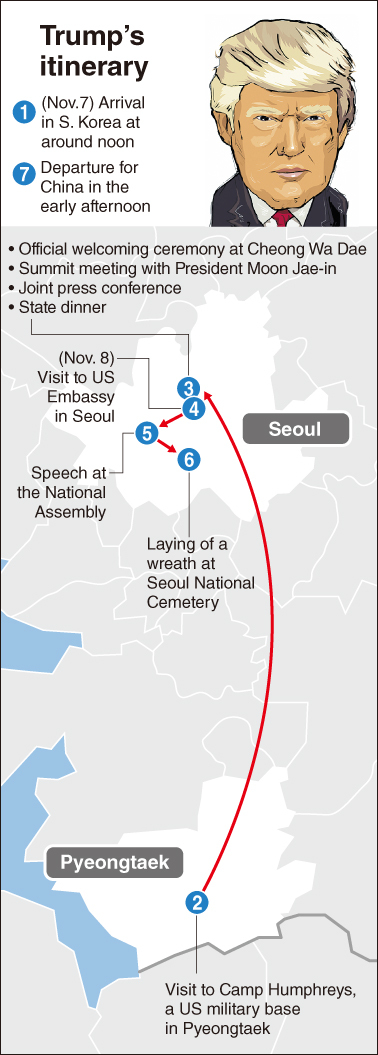Koreans to President Trump: No tough talk, please
US leader’s visit reveals old divide in S. Korea over how to view US amid security crisis
By Ock Hyun-juPublished : Nov. 6, 2017 - 18:34
With US President Donald Trump set to touch down in South Korea on Tuesday, South Koreans have varying expectations on the visit of a man who can exert an immense influence over their fate, with or without the intention to do so.
Many South Koreans that The Korea Herald spoke to hoped for one thing in common: that Trump’s arrival in this once war-torn land where threats of war are part of everyday life would lead to an easing, not escalation, of military tensions with North Korea.
Many South Koreans that The Korea Herald spoke to hoped for one thing in common: that Trump’s arrival in this once war-torn land where threats of war are part of everyday life would lead to an easing, not escalation, of military tensions with North Korea.

“I am worried about what President Trump will say here and North Korea’s possible military provocations that may follow,” Park Geun-young, a 36-year-old office worker.
What worries people most is Trump’s unpredictable style and impromptu remarks.
Trump’s visit on Tuesday and Wednesday comes amid heightened tension after an exchange of war-like rhetoric between Washington and Pyongyang in recent months.
Most South Koreans have grown numb to the North’s bellicose language from decades of acrimony, but hearing that from the US leader was different. As Trump talked of “fire and fury” and threatened to “totally destroy” the Kim Jon-un regime, they have begun to take the possibility of war more seriously and fear the outcome of a possible miscalculation on the part of Kim, or Trump.
“There should be no war, but I am a little concerned about the possibility (of war) because we don’t know what they will do next if they cannot make sense of each other,” said a 40-year-old officer worker, who only gave his surname Yang.
“I think Trump gave us a good opportunity to push to develop our own nuclear arms. At least, a chance to advance our military and defense capabilities,” he added.
The state visit of the US leader who talks “America first“ has also awakened an old divide in South Korea over how to view the world‘s greatest power, prompting civic groups at extreme ends of the political spectrum to stage anti-US or pro-US rallies on Saturday and Sunday. More rallies are planned during Trump‘s two-day stay here.

“The Korea-US relationship is a distorted alliance as we are unable to say ‘No’ to the US in any situation. We should get out of the shadow of the US,” said Seo Eun-hwa, 46, who joined an anti-US rally with her 18-year-old daughter in Seoul on Saturday.
“It is not about Trump. I am opposing his authority as the leader of the most powerful country in the world,” she said.
Some protesters slam Trump for prompting discrimination against foreigners, minorities and women.
“Trump represents hatred, discrimination, conflicts and confrontation. I don‘t welcome him here,” said Jung Young-sup, secretary-general at a non-governmental civic group People’s Solidarity for Social Progress.
There have always been anti-US protesters when US leaders visited Korea. In 1993, anti-America protestors condemned the US for pressuring the country to open its rice market during then-President Bill Clinton’s visit here. When George W. Bush, who referred to North Korea as part of “the axis of evil,” was here in 2002 and 2008, they blasted the US for its hostile policies toward North Korea and negotiation of Korea-US free trade deal, respectively. When Barack Obama came here in 2009, they took to the streets against the re-dispatch of Korean soldiers to Afghanistan.
But the latest standoff between the North‘s Kim and Trump and the US leader’s controversial remarks and confrontational trade policy toward South Korea seem to have provided even more reasons for far-left groups to condemn the US.
They demand Korea pursue a more independent foreign policy without being swayed by the US, believing that the US is using the Korean Peninsula’s continued tensions as an opportunity to sell its weapons and expand its clout over Asia. They also see the US as an obstacle to the two Koreas’ reunification.
Only a hundred meters away, pro-Trump and right-wing protestors welcomed Trump’s visit here.
“We absolutely welcome President Trump. The US is the country that has helped us for the past 70 years. The Korea-US alliance is the only way to stop South Korea falling under the communist regime,” said Hong Tae-joon, 87, who fought during the Korean War alongside UN troops.
“I am thankful to the US. Thanks to the US, we could develop our country,” he said. “I am sorry to North Korean people suffering from poverty and hunger under the Kim Jong-un regime. Kim is a dictator.”
In the eyes of protesters, mostly influenced in the aftermath of the 1950-1953 Korean War, the US is not only a symbol of the liberal democracy they have fought for, but also the savior that rescued them from North Korea’s brutal communist rule and poverty.
South Korea received official development aid from foreign countries totaling about $13 billion, which contributed to Korea’s economic rise from the ashes of the war. The US was one of the biggest donors.
But the opposing rallies drew a lot less people than expected. Many citizens who walked past the protestors respected their freedom of expression, but distanced themselves from the messages.
“I think both anti-US and pro-US protestors are too radical,” Oh Yeon-ji, 33, said near the protest scene on Saturday.
Many citizens here view both movements as “radical” and they largely believe that the Korea-US alliance is still vital for Korea to combat the communist regime’s growing nuclear and missile threats.
“We need the US and the US also needs Korea for our mutual interests in terms of defense and the economy. But we should refrain from relying on the US too much,” said Jang Byung-joon, 18.
According to a Gallup Korea poll conducted in May, 55 percent of the respondents said that South Korea’s relationship with the US was the most important, while 36 percent of them said its relationship with China was the most important.
The survey also showed that only 9 percent of them had “favorable feelings” toward Trump.
Some praised Trump’s hard-line stance on North Korea.
“I am positively viewing Trump’s hawkish attitude to North Korea as I think common sense doesn’t work for North Korea,” said Ha Ji-won, a 23-year-old student.
But in the face of renegotiation of the Korea-US Free Trade Agreement and China’s economic retaliation against Korea in protest of a US anti-missile system being deployed here, some want Korea to be more flexible in its diplomacy and chart its own course rather than be swayed by the US.
“There is no reason we shouldn’t maintain our firm alliance with the US. But it would be problematic if the Korea-US alliance results in harming our relationship with China because that would damage our interests,” said Jung Gu-hoon, a 30-year-old office worker.
“We should seek a balance in our diplomatic relations with neighboring countries.”
Yoon Pyeong-joong, professor of political philosophy at Hanshin University, said that the escalating rallies and debate over Trump‘s visit show what the US means to South Korea.
“South Korea has had very close ties with the US since its foundation. Without the US, its modern history cannot be explained,” Yoon said. “The fierce pro-US and anti-US protests are a reaction to the US‘ strong influence on Korea in political, militaristic and economic aspects.”
And he said that the reason more protests seem to be taking place this time ahead of Turmp‘s visit is because “it is generally perceived here that Trump’s behavior and comments raise a possibility of war on the Korean Peninsula.“
By Ock Hyun-ju (laeticia.ock@heraldcorp.com)
-
Articles by Ock Hyun-ju



















![[Today’s K-pop] Treasure to publish magazine for debut anniversary](http://res.heraldm.com/phpwas/restmb_idxmake.php?idx=642&simg=/content/image/2024/07/26/20240726050551_0.jpg&u=)